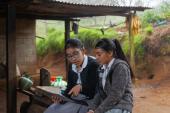Blog post
Education for integrity: our youth, our future

To support countries in educating young people about the benefits of public integrity and reducing corruption, the OECD recently published the resource book Education for Integrity: Teaching on Anti-Corruption, Values and the Rule of Law. Drawing on existing good practices from around the world, Education for Integrity provides a comprehensive framework for implementing education for public integrity in the school system and in the classroom. It also contains useful sample lessons and tasks on anti-corruption, values formation and understanding the rule of law. Several key principles that can be found throughout the resource book include:
Play the long game
There are many “quick fixes” in the anti-corruption world, but education is not one of them. By its nature, education is a slow process, a reality that is reflected in the way we establish our education systems. However, a multitude of factors, ranging from a limited budget, failure to involve the education ministry, and short-term policy focus, can lead policymakers to choose short-term solutions, such as an anti-corruption app or an Anti-Corruption Day, as the core policy response to engage youth. While these solutions clearly have merit and should not be disregarded, they should be seen as tools in a broader, more comprehensive educational programme. Education for Integrity emphasises the necessity of mobilising the key stakeholders to incorporate education for integrity into the school system.
Prepare the evidence base
The full effects of education for public integrity on behaviour change will not be visible immediately. However, systematically collecting and analysing data to assess the short, medium and long term impact is critical. As such, Education for Integrity points to several options that could be used to evaluate the effect of education for public integrity. These options include: regression discontinuity analysis approaches, qualitative and participatory research methods, and using behavioural insights to assess the effects of the education programme on short-term behaviour change.
Support the teachers
Corruption can be a difficult topic to discuss. Teachers not only need the skills to handle these tough conversations, but also the ability to let their students know that their voices matter. Moreover, modelling integrity behaviour such as fairness, openness and respect, helps teachers demonstrate to their students what integrity looks like in practice. Education for Integrity emphasises the role of teacher-training programmes to mobilise educators. It also contains practical tips for teachers on developing lesson plans and tasks, selecting supporting materials, ensuring impact and relevance for students and managing interactive group tasks.
Leverage cross-curricular approaches to involve all students
There is an assumption that primary school students cannot handle topics like corruption and the rule of law. There is some merit to this, for example, as students who are still learning the basics of mathematics cannot be expected to debate the impacts of bribery on economic growth. But they can talk about the core values that underpin ethical behaviour: integrity, fairness, and honesty. Indeed, teachers can use the language class to read stories that teach students the value of doing the right thing when no one is watching. Teachers can use the science lesson to discuss why being honest about the findings of an experiment is important to uphold the integrity of evidence. The proposed public integrity learning outcomes and sample lesson plans in Education for Integrity can be integrated across subjects, giving educators the opportunity to teach about integrity and anti-corruption in a variety of contexts.
Where do we go from here?
An assumption exists that only the “really corrupt” countries need to educate about integrity, but this is an issue for everyone. Under the OECD Recommendation on Public Integrity, all OECD member countries are called on to empower their young people to stand up for integrity and challenge corruption and unethical behaviour. Going forward, the OECD will continue supporting countries to educate for integrity, developing the tools and sharing the good practices to enable policymakers, educators and youth to be integrity champions.
*Across a range of country projects, Carissa Munro provides technical guidance to mobilise society in the fight against corruption through educating for integrity, awareness-raising and private sector initiatives.
-
nga armand véronique
13.06.2018
Bonjour, je travaille à la Commission Nationale Anti-Corruption (CONAC) du Cameroun. Entre autres missions qui m'incombent, je suis en charge de la mise en oeuvre du Programme National d'Education à l'Intégrité (PNEI) élaboré par la CONAC en vue de promouvoir les principes et valeurs d'intégrité en milieu jeune et principalement dans le secteur éducatif. A ce titre, j'accueille très favorablement et avec grand intérêt cette publication dans la mesure où elle contribuera à améliorer ma connaissance des problématiques liées à la lutte contre la corruption en milieu éducatif. Vivement que l'IIPE mette à notre disposition cet ouvrage et nous offre des formations dans le domaine de l'Education à l'Intégrité. -
Carissa
28.06.2018
Dear Raul,
Many thanks for your questions, I would be happy to discuss in more detail. Feel free to contact me at GOVintegrity@oecd.org.
All the best,
Carissa -
Carissa
28.06.2018
Merci pour votre commentaire. N'hésitez pas à me contacter à GOVintegrity@oecd.org pour en discuter.
Carissa -
marta
11.06.2018
Dear Carissa Munro,
Your materials are very interesting and useful. Could You advice me some training exercise of anti-corruption for children of 10-12 years old ?
I will be very grateful!
Thank's
Best regards,
Marta
-
Carissa
28.06.2018
Dear Marta,
Thank you very much for your feedback. Please feel free to get in touch with me at GOVintegrity@oecd.org and we can discuss further.
Best,
Carissa -
Jawara
28.01.2022
Good morning Carissa
I am coming in contact with this training platform for the very first time. I work at Anti-Corruption Commission Sierra Leone as Head of Outreach. Could you advice on any new initiative that would promote community engagement and meeting.
Thanks so much for this amazing services you are rendering to the world. Merci







07.06.2018
I would like your support to enable the data collection of my academic project. The objective of the project is to show the efficiency of one of the proposals contained in the package of measures launched by Transparency International Brazil. The main points of the proposal are:
- Inclusion in the curriculum of basic and secondary education related to ethics education, solidary citizenship, participation in public management and control of public expenditure.
- Alteration of the National Curricular Common Base to include in the education of children and adolescents information about causes, impacts, risks, damages and means of coping with corruption.
I intend to use the Economic Law Analysis approach to measure efficiency using the Kaldor-Hicks method. For this I need data on the costs and benefits involved in the proposition. The OECD article that was used as a reference in the TI Brazil presentation mentions some countries that are adopting the measures but, however, there is no data on benefit measurement. So I would kindly ask you to support me to make this data viable.
Thank you very much in advance,
Regards,
Regards,